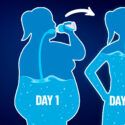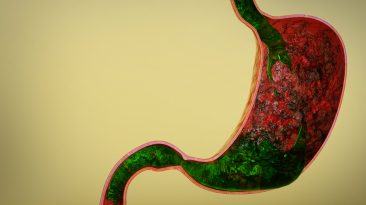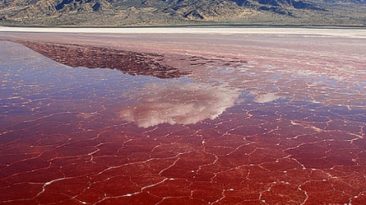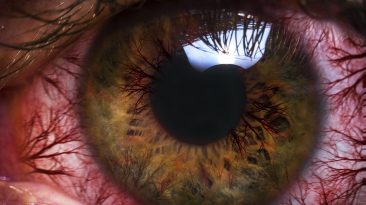Tritium. It’s that mysterious glowing element found in air, water and now inside you. That’s right. You’re going take this radioactive isotope and chug it down. Bottoms up! So if you drank tritium, how could your body power a nuclear reactor? What would happen to your DNA? And would you glow in the dark?
So what the heck is tritium anyway? Simply put, it’s the radioactive form of hydrogen. Hydrogen with two extra neutrons, to be exact. And that combination makes it unstable. It can be found in either a gas or liquid form. For our experiment, we’ll be dealing with the liquid. It’s in the atmosphere when cosmic rays hit gases floating up there. You don’t need to look up to find it. It’s right here on ground.
Manufacturers mix tritium gas with a little bit of phosphor to create a self-luminous light source that doesn’t need electricity. That makes it perfect for exit signs and emergency lighting. But if this isotope entered your body, how long would it take to get it out? Tritium emits beta radiation, meaning it gives off energy as it decays.
Typically, its weak particles aren’t strong enough to penetrate the skin. So it wouldn’t be your skin glowing. We’ll dive further into that later. Doctors often use small amounts of tritium to trace chemical compounds in the human body. But you, in all your wisdom, are gulping down a 4.5 l (1 gal) of this stuff. So what happens next?
Once you consume this isotope, it goes right through your bloodstream via your gastrointestinal tract. Minutes later, it would be in your organs and your tissue. And in less than two hours, the tritium would contaminate all your bodily fluids. A study published by the International Atomic Energy Agency (IAEA) found that 56% of rats drinking tritium-laced water developed tumors within 18 months.
Considering how much you just drank, maybe that would be your fate. Even if you guzzled less than a few liters, it would take a month to pee out all the tritium. Beta particles, the radioactive element in tritium, have low energy and wouldn’t be able to travel far throughout your body. Sounds good, right? Think again.
These particles would clump together in certain places in your body, creating radioactive hotspots. These small areas would be bombarded with radiation. So would those areas give off a less than healthy glow? Remember, tritium needs phosphorus to light up. So overeating phosphorus-rich food, like meat, eggs and some dairy products, could start a chemical reaction.
Your stomach could light up like a glow stick. And that light would be absorbed in all the surrounding tissue. But this isn’t a party trick you want to do often. These photons contain such a high amount of energy that they could alter your DNA permanently. Now that tritium is coursing through your system, would you be able to generate power?
Again, since tritium breaks down over time, some companies have developed tritium batteries that can last more than 20 years. But even though you might be a walking night light, it wouldn’t work that way. The radiation emitting from the decaying tritium would have to hit a semiconductor to carry an electrical charge. That’s a relief. But even if you haven’t downed liters of tritium, is there a chance it’s already inside you?
Well, maybe, if you live near a nuclear reactor. As I said, tritium is the by-product of nuclear reactors. And while it can be separated from water, the process is costly, so many power plants don’t consider it an extra step worth taking since the material eventually breaks down. Even the infamous Fukushima plant in Japan will discharge its treated water beginning in 2023.
In Florida, scientists studied a nuclear power plant and found an elevated tritium concentration in the drinking water. While those levels were still below EPA standards, it was up to 215 times that of the background level of radiation.
Sources
- “Tritium – Fact Sheet”. 2012. nuclearsafety.gc.ca.
- “Tritium (Hydrogen-3)”. 2001. hpschapters.org.
- “Contaminated Water From Fukushima To Be Discharged To The Sea”. 2021. neimagazine.com.
- “Tritium Levels No Threat To Our Drinking Water, By Dr. David Roelant”. Dr. David Roelant. 2016. arc.fiu.edu.
- “Study On The Carcinogenic Effect Of Long-Term Drinking Tritiated Water In Rats”. Shuai, Zou, Li Maohe, Wang Hui, and Lin Suqin. 1993. Radiation Protection (Taiyuan) 13 (1): 64-67, 71. inis.iaea.org.



























